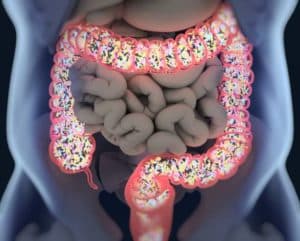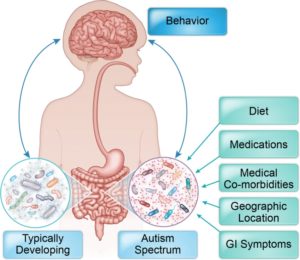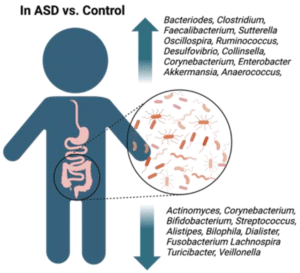CONTACT
We will reply as soon as possible.
Enevia Health, LLC
30 N Gould Ste N, Sheridan, WY 82801, USA
The microbiota and its metabolites play a fundamental role in maintaining health and balancing the immune system, as well as in the production of vitamins and the metabolization of nutrients.
In the previous article we observed the importance of the microbiome-gut-immune system-brain axis and how communication errors between these systems could negatively impact gastrointestinal and/or mental health. The authors of the study, which we talked about in the previous article, came to the conclusion that in cases of autism spectrum disorder (ASD) it was necessary to study and address both mental health and gastrointestinal health, seeing a possible new therapeutic avenue in modulation of the intestinal microbiota.
We know that the intestinal microbiome is unique in each individual and that it is composed of an infinite number of microorganisms (bacteria, parasites, viruses and archaea) and their metabolites, but we also know that it is modulable.



Microbial variability and, consequently, its metabolites, can be affected by many factors, including genetics, age, sex, cultural habits, diet, lifestyle, medications and exposure to pathogens, among others. . Then by working on some of these factors we can make important changes in the intestinal microbiome.
The metabolites produced by the intestinal microbiota have different effects on human health and well-being. Some of the most important metabolites are:
In summary, gut bacteria produce a wide range of metabolites that can influence health and well-being. These metabolites participate in maintaining the integrity of the intestinal barrier, in regulating the immune system and in energy metabolism. Knowing and understanding the functioning of these bacterial metabolisms and how they affect will be necessary to understand the relationship between the intestinal microbiota and human health.
There are microbial patterns that depend on certain variables and some of these can be associated with known disorders and diseases (gastrointestinal disorders, metabolic diseases, autoimmune disorders and neuropsychiatric disorders). At this point, it is logical to ask whether there is a specific microbial pattern for autism spectrum disorders (ASD).



To find out if there really is a generalized difference between the microbiome of ASD children and that of neurotypical children, countless studies have been carried out. Some have focused on the observation and comparison of the microbiota in children with neurodevelopmental disorders and neurotypical children using advanced DNA sequencing techniques to analyze the microbial composition and diversity in stool samples, others have focused on the study of the metabolites produced by that microbiota and some included samples of the maternal microbiota. The sequencing techniques used made it possible to identify and quantify the microorganisms present in the intestine with a high degree of precision.
In some of these studies, standardized questionnaires were added to evaluate participants' gastrointestinal and neurological symptoms.
As an example, let's look at the results obtained in some of these studies:
In a more current review, December 2023, by the Division of Molecular Microbiology, Burnett School of Biomedical Sciences, College of Medicine, University of Central Florida, called: 'The Role of Short-Chain Fatty Acids and Altered Microbiota Composition in Autism Spectrum Disorder: A Comprehensive Literature Review', a total of 22 studies were analyzed (including those mentioned above), the first from 2004 and the last from 2023 and with all this it could not be concluded that there was an exact characteristic profile in patients with ASD, however, they were found certain patterns.
The explanation for these results could be attributed to the diversity of the patients, since ASD has a fairly wide range of symptoms, comorbidities and factors that participate in its development, both genetic and environmental; that the sample sizes were small; and that the variability of the microbiome depends on many other factors, such as geographical origin, different diets, age, lifestyle or even the use of antibiotics, among many others.

All these findings suggest that there is an association between the composition of the intestinal microbiota and its metabolites with the development and expression of ASD and that in addition the composition of the microbiota of ASD children differs from that of neurotypical children.
A regulation of the microbiome could contribute to the improvement of ASD symptoms. Research in this field needs many more studies to fully understand the relationship between the gut microbiome, ASD and its clinical relevance.
Article written by Enevia Health Collaborator: Loles Marco
Graduated in Human Nutrition and Dietetics.
lolesmarcobermudo@gmail.com
To learn more about this topic, we leave you the link to the previous article and our Web
We will reply as soon as possible.
30 N Gould Ste N, Sheridan, WY 82801, USA
Our groups are the ideal platform to learn and share your scientific concerns about neurodevelopment issues
*Our purpose is informational only, it is not intended to be a substitute for medical advice, diagnosis or treatment.
We are working on our website. For any queries, you can contact our customer service team at atencionalcliente@eneviahealth.com